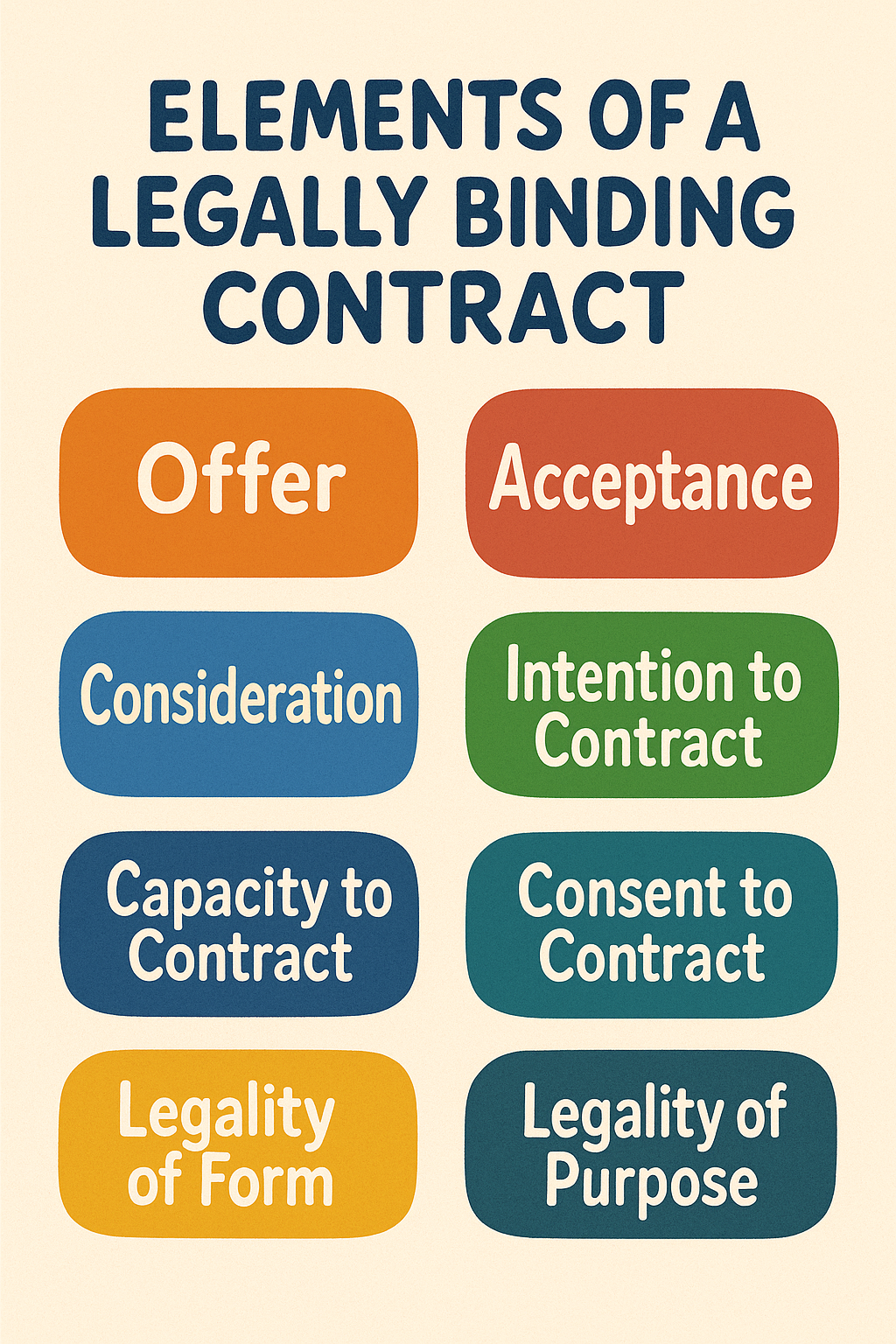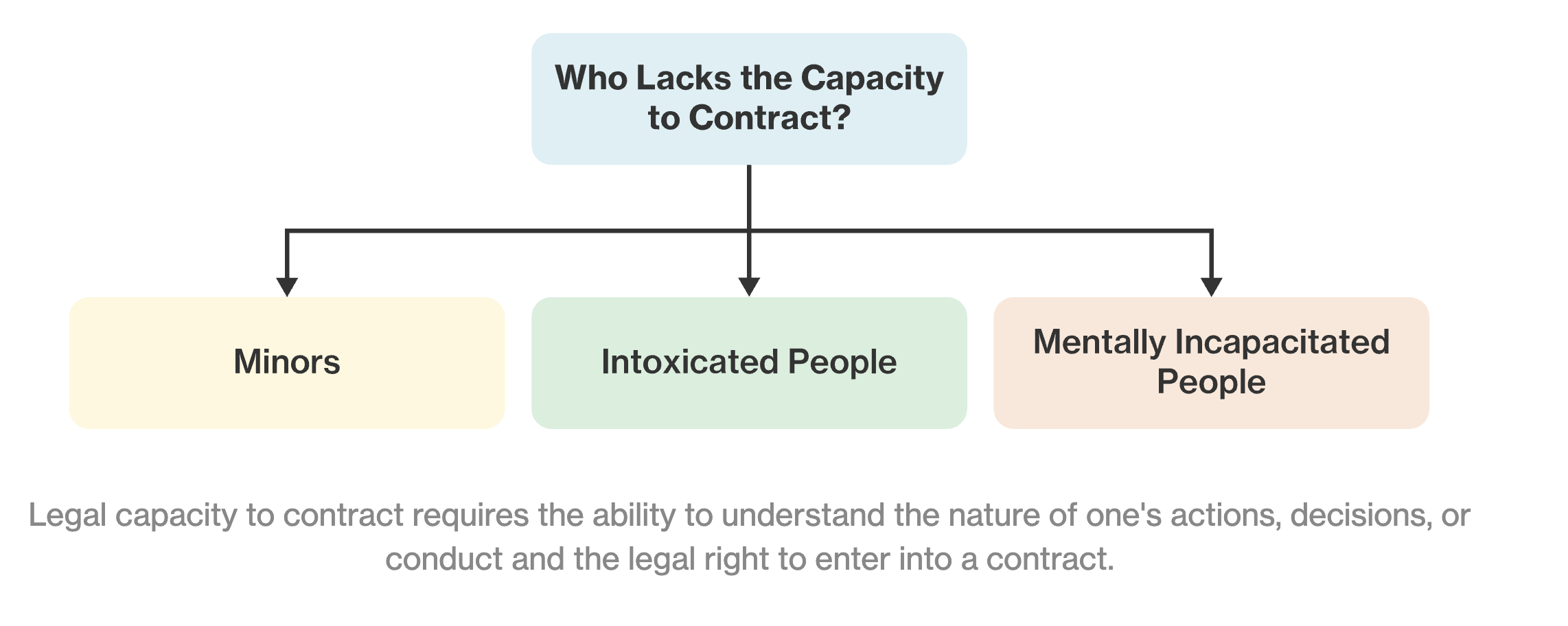Photo AI
Last Updated Sep 26, 2025
Contract Law Simplified Revision Notes for Leaving Cert Business
Revision notes with simplified explanations to understand Contract Law quickly and effectively.
374+ students studying
Contract Law
A contract is a legally binding agreement between two or more parties, where each side promises to do something in exchange for a benefit. Once formed, it can be enforced by law. It can be verbal, written or implied by conduct.
Elements of a Legally Binding Contract
There are eight essential elements required for a contract to be valid in Irish law. If any one of these is missing, the agreement may not be legally enforceable.
- Offer
- Acceptance
- Consideration
- Intention to Contract
- Capacity to Contract
- Consent to Contract
- Legality of Form
- Legality of Purpose

1. Offer
- An offer is a clear, unambiguous proposal by one party (the offeror) to another (the offeree) to enter into a contract on certain terms. It must be communicated clearly, either verbally, in writing, or by conduct.
- For example, "I will sell you my car for €5,000" is an offer. However, a shop displaying a product with a price tag is not an offer but an invitation to treat—this invites customers to make an offer to buy, which the seller may then accept or reject.
An invitation to treat is not an offer, but an invitation for others to make an offer. It shows a willingness to enter negotiations, but cannot be accepted to form a contract. Examples include:
- Goods displayed in a shop window or on a shelf
- Advertisements in newspapers or online
- Restaurant menus or catalogues The seller is not legally bound to sell at the displayed price. A contract is only formed when the customer makes an offer and the seller accepts it.
2. Acceptance
- Acceptance occurs when the person receiving the offer agrees to it exactly as it is, without any conditions or changes. This agreement must be communicated to the offeror. If the offeree attempts to alter the terms, this is a counter-offer, not acceptance.
- Acceptance can be communicated verbally, in writing, or by conduct. Silence does not count as acceptance.
3. Consideration
- Consideration is the exchange of something of value between the parties. Both parties must give something in return for the promise of the other. Consideration can be money, goods, services, or a promise to do or refrain from doing something.
- The consideration does not need to be equal in value but must be real and not vague. For example, if a person agrees to paint a house in exchange for a car, both have provided consideration, even if the car is worth more than the service.
4. Intention to Contract
- Both parties must intend that the agreement will be legally binding. In business agreements, there is a presumption that the parties intend legal consequences. However, in social or domestic arrangements (such as an agreement between friends or family members), it is presumed that there is no intention to create legal obligations unless proven otherwise.
- For example, an agreement to meet a friend for coffee would not be a contract, but a business deal between two companies would.
5. Capacity to Contract
- The people entering into the contract must have the legal ability to do so.
- This means they must be:
- Over 18 years of age,
- Of sound mind,
- Not under the influence of drugs or alcohol at the time of the agreement. Certain groups, such as bankrupt individuals or company directors acting outside their authority, may also lack capacity.

6. Consent to Contract
- All parties must freely agree to the terms of the contract. If one party is pressured, threatened, lied to, or misled, genuine consent is not present, and the contract may be invalid.
- Lack of consent can result from:
- Duress (threats or pressure),
- Undue influence (abuse of a relationship of trust),
- Misrepresentation (false or misleading information).
7. Legality of Form
- Some contracts must be in a particular format (usually in writing) to be valid.
- Examples include contracts for the sale of land, hire purchase agreements, and certain insurance contracts.
- If a contract is legally required to be written and it is not, it may be unenforceable in court
8. Legality of Purpose
- A contract must have a legal purpose. It cannot involve anything illegal, such as committing a crime, breaking the law, or engaging in fraud.
- A contract to sell stolen goods, for example, is void and unenforceable.
Conditions and Warranties in a Contract
In any legally binding contract, the terms can be divided into two categories: conditions and warranties.
Condition
- A condition is a fundamental term of the contract.
- It goes to the very heart of the agreement. If a condition is breached, the injured party is entitled to treat the contract as terminated and may also seek damages.
- Example: A customer orders a new laptop with a specific processor. If the company delivers a different model without that processor, the customer can reject the product and cancel the contract.
Warranty
- A warranty is a less important term of the contract. It is not central to the agreement.
- If a warranty is breached, the injured party cannot cancel the entire contract but may still claim compensation (damages).
- Example: A customer buys a car and is promised it will include new floor mats. The car is delivered without them. This is a breach of warranty—the customer cannot reject the car but can seek compensation for the missing mats.
- Breach of a condition: The injured party may terminate the contract and claim damages.
- Breach of a warranty: The injured party may only claim damages—the contract remains in force.
Case Study: The Coffee Cart Contract
Emma, a recent graduate, had long dreamed of setting up her own mobile coffee business. One evening, while scrolling through an online business forum, she saw a post from a user named Jake:
"Coffee cart for sale – includes espresso machine, grinder, and stock. €6,000. Contact for details."
At this stage, no contract could be formed. The ad was not a legal offer but an invitation to treat—an invitation for others to make offers or begin negotiations. Jake had not committed to selling to anyone at that price; he was simply inviting interest.
Emma messaged Jake to express her interest, and they arranged to meet in person. When they met, Jake said:
"I'm willing to sell you the cart, the coffee machine, the grinder, and one month's supply of cups and beans for €6,000."
This was a clear and definite offer, made directly to Emma. It included specific terms and showed Jake's intention to enter a binding agreement.
Emma replied without hesitation: "Yes, I'll take it at that price." Her reply matched the offer exactly, with no changes or conditions. This was valid acceptance. Later that evening, they drew up and signed a short written contract listing the agreed items and confirming the price and handover date.
The next morning, Emma transferred €6,000 into Jake's bank account. In return, Jake handed over the cart and equipment. Because both parties had provided something of value, there was valid consideration—Emma's money in exchange for Jake's goods.
This was clearly a business arrangement, not a casual or domestic promise. Both parties intended the contract to be legally binding, which the law presumes in commercial dealings.
Emma was 22 years old, sober, and mentally competent. Jake was a self-employed entrepreneur. Both parties had the legal capacity to contract—they were over 18, not under the influence, and fully able to understand the terms.
There was no sign of pressure or dishonesty. Emma had the chance to inspect the cart and ask questions. Jake gave accurate information about the equipment and answered her concerns. This meant both parties gave genuine consent, free from duress, undue influence, or misrepresentation.
Although the law did not require a written contract in this situation, they signed one anyway. This ensured legality of form, particularly helpful for clarity and future reference.
The contract involved the sale of legal goods for a lawful business, so it also satisfied legality of purpose. There was no illegal content or criminal activity involved in the transaction.
Emma began trading the following week. At first, business was steady—but she soon ran into a serious problem. The espresso machine, the most valuable item in the bundle, wouldn't power on. A technician diagnosed a burnt-out circuit board and estimated a €2,000 repair cost.
Emma checked the contract, which stated that all major equipment was "in good working order." She had asked Jake about this at the meeting, and he had assured her that everything worked perfectly. The condition of the espresso machine was central to the agreement—a condition, not a minor term. Because this promise was not fulfilled, Emma was entitled to terminate the contract or seek compensation.
At the same time, she noticed that a large box of branded cups and napkins was missing from the supplies. This was frustrating, but it didn't stop her running the business. These items were mentioned in the contract, but were not essential to performance. They would be considered warranties—non-fundamental terms. Emma couldn't cancel the contract over them but could reasonably request damages or a partial refund.

500K+ Students Use These Powerful Tools to Master Contract Law For their Leaving Cert Exams.
Enhance your understanding with flashcards, quizzes, and exams—designed to help you grasp key concepts, reinforce learning, and master any topic with confidence!
70 flashcards
Flashcards on Contract Law
Revise key concepts with interactive flashcards.
Try Business Flashcards7 quizzes
Quizzes on Contract Law
Test your knowledge with fun and engaging quizzes.
Try Business Quizzes29 questions
Exam questions on Contract Law
Boost your confidence with real exam questions.
Try Business Questions27 exams created
Exam Builder on Contract Law
Create custom exams across topics for better practice!
Try Business exam builder84 papers
Past Papers on Contract Law
Practice past papers to reinforce exam experience.
Try Business Past PapersOther Revision Notes related to Contract Law you should explore
Discover More Revision Notes Related to Contract Law to Deepen Your Understanding and Improve Your Mastery
